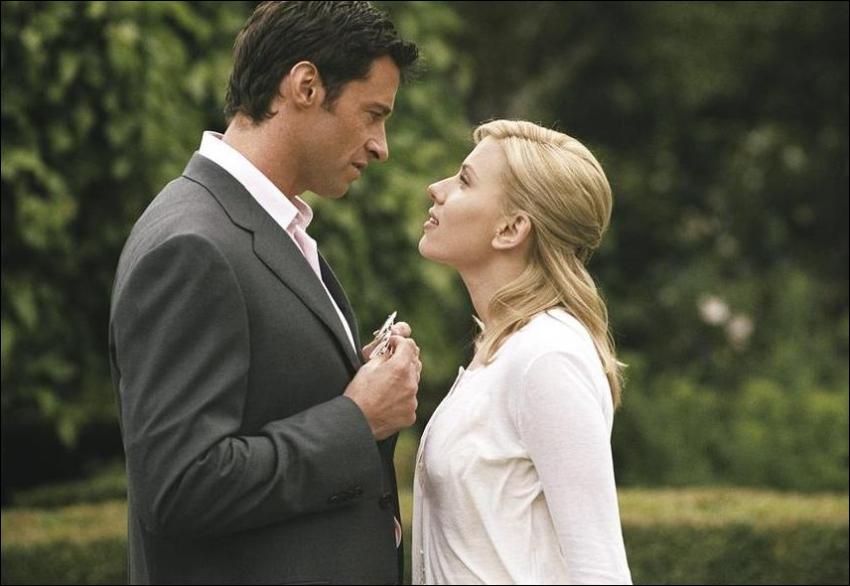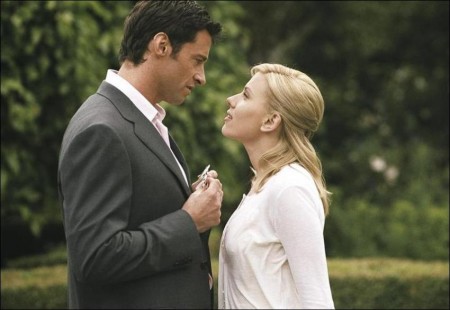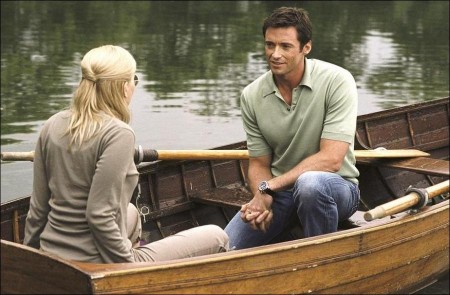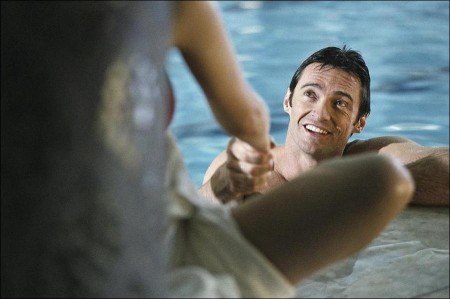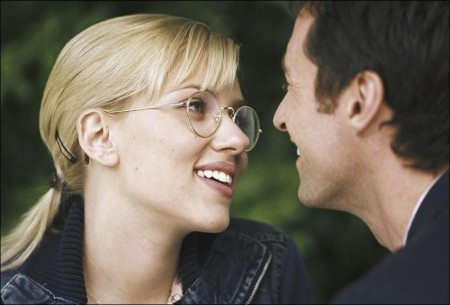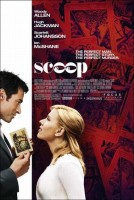Tagline: The Perfect Man, The Perfect Story. The Perfect Murder.
“Scoop” is the contemporary comedy from writer / director Woody Allen, and is his second consecutive film to be set and shot in London (following Match Point). “Scoop” stars Mr. Allen, Hugh Jackman, Scarlett Johansson, and Ian McShane.
The late U.K. journalist Joe Strombel (played by Mr. McShane) is being mourned by his colleagues – even as, stuck in limbo, Joe remains committed to pursuing a hot tip on the identity of “the Tarot Card Killer” at large in London. But how can his legwork get done now? Via the very much alive Sondra Pransky (Ms. Johansson).
Sondra is an American journalism student visiting friends in London. During a stage performance by another American, magician Sid Waterman (Mr. Allen), Sondra is shocked to find herself able to see and hear Joe. From beyond, he gives her the scoop of a lifetime and urges her to pursue it. Sondra immediately starts chasing the big story, enlisting the aid of a reluctant Sid (a.k.a. Splendini). That chase leads right to handsome British aristocrat Peter Lyman (Mr. Jackman). Soon, Sondra finds that the romance of her life may well be the dangerous scoop she’s looking for.
Under Suspicion: Q&A with Hugh Jackman
Q (interview by Maitland McDonagh): What kind of movie is Scoop?
Hugh Jackman: It’s a smart, funny, and witty comedy, with a couple of dark moments. I’m a huge fan of Woody Allen’s movies, and when I read the script, it kind of reminded me of some of his earlier comedies.
In the plot, Scarlett Johansson and Woody’s characters get a tip that my character might be a serial killer. But my character happens to be a budding politician and the son of a Lord. So he’s in every way the opposite of a person you might suspect to be a serial killer. The evidence starts to mount, Scarlett’s character starts to fall in love with mine, and it gets very complicated.
Q: What kind of person is your character, Peter Lyman?
HJ: Well, I saw him as someone who you’d find in the pages of Hello! or OK! magazines in England. Unlike American tabloids, these have [coverage of] the social set, aristocrats and their offspring. Peter is from a very well-established family; he’s a debonair man about town who dates the latest models.
Q: How does he get involved with Scarlett’s character?
HJ: She gets this tip – from a ghost – that Peter might be a serial killer, and she’s doggedly chasing it; she and Woody’s character try to investigate my character. Peter’s world is quite stitched up and very formal. When he meets Sondra – [although] he [initially] knows her as Jade Spence – he’s completely intrigued by her and a little bit knocked sideways by her. She’s very beguiling, beautiful, spunky, charming, and very forthright. And dare I say it, he starts to fall in love with her.
Q: Her character sounds like a spunky reporter, from classic movies, who speaks her mind and goes after what she wants.
HJ: The way Scarlett plays her, it is a little bit of a throwback to those spunky young reporters in old movies.
Q: How did Woody Allen approach you to play Peter?
HJ: I got a phone call from my agent saying that the casting director for Woody Allen wanted to see me – for a movie shooting in England, which seemed odd to me; a Woody Allen movie shooting in London sounded like a contradiction. I was also told not to be offended if my meeting with Woody only took two minutes.
Well, the meeting actually took about three minutes, so it obviously went pretty well [laughs] He was sort of like, “Well, I’ve got this movie and I know you’ve probably got more important things to do. But if you want to read it – you probably don’t, but if you do and you like it, then, you know, I’d love you to do it.” And that was pretty much it. It was, and continued to be, easy. Scoop was one of my favorite film experiences to date.
Q: You worked with him as a director, and as an actor as well –
HJ: [laughs] “Working with Woody Allen – “ I just love saying that, “Working with Woody Allen…” I did have to pinch myself on several occasions…Working with him was terrific, because the atmosphere that he creates on set is incredibly easy. It’s very calm, and all of a sudden, at 3:00 in the afternoon, he sends you home – almost like bankers’ hours.
He doesn’t do a lot of takes; there’s not a lot of rehearsal. I have to kiss Scarlett in this movie – it’s a tough job, but someone’s got to do it – and Woody didn’t do a lot of takes [of those scenes]. However, it was good [for] when I came home to my wife; “Darling, one take, that’s all it was…”
The big problem for me was that Woody likes to ad-lib occasionally, particularly on his lines. He’s fine if you want to ad-lib something. Of course, every time he ad-libbed, it was funny and it was different – and I found myself laughing, and he’d occasionally get a little upset with me. He’d be like, “No, no, no, please, my character is boorish; he’s not funny.” I said, “But if you keep ad-libbing like that and I’m in the shot, I’m going to laugh. You’ve got to be a little more boring. It was also terrific to watch Woody and Scarlett working together. They have a unique rapport. I can see why he had asked Scarlett to come back and work [with him] again [after Match Point]. They are very funny together on-set, and they made everybody laugh a lot.
Q: How did you find working with her?
HJ: She’s kind of extraordinary, really, because the girl can do anything. On film, she just lights up. On the set, we’d sing together; she can sing like an angel. She can dance, too. Pretty much everyone on the crew had a crush on her. She’s unbelievably down-to-earth, incredibly talented, very poised. There was not a hard day’s work on the entire movie, working with her. I’ve just worked with her again, on a Chris Nolan movie [The Prestige].
Q: With your character part of a mystery, how did you approach the ambiguity of playing him?
HJ: Since the movie is a mystery as well as a comedy, you’re following their relationship and you’re not sure if he really is a killer or not. I’m Australian but I have English parents, and I have spent a lot of time there, and they don’t let you see very much; it takes a long time before you really get to know an English person. So I wanted to make Peter charming and also a little reserved. That way, he’s a little more enigmatic…and this can keep the audience guessing right to the end.
Q: What was it like shooting in the U.K. with a quintessentially American director?
HJ: He’s beloved over there; the actors that we had on Scoop were incredible. I mean, people would come in for the day that were knighted – Sir this and that. They would come in because they just wanted to work with Woody Allen. He was bowled over. But he said, “I feel bad; all I have to give them is one line.” There’s not a lot of film work that happens in London, and certainly not a lot of films of the caliber of a Woody Allen movie. So, everyone working on it felt privileged and honored.
Q: Did you ever feel like you were looking at London through a fresh pair of eyes?
HJ: Well, Woody doesn’t like direct sunlight when he shoots outside. Direct sunlight can be very harsh; he thinks it makes for a slight ugliness on the actors. So this was the first time that I’ve ever worked in England where everyone would be thrilled when it was overcast and gray. I don’t know if he’d been setting out sacrifices to the gods, but it was like four weeks of straight cloudy weather with hardly any rain – extraordinary. Normally, people complain a lot there about the weather, but I was around a lot of very happy people. The whole thing was a real thrill, and a great opportunity. I’m forever grateful for it.
London Calling: Q&A with Woody Allen
Q (interview by Jason Simos): You’ve said before in interviews that you often have several potential film projects percolating at once. How exactly was it that Scoop jumped to the fore?
Woody Allen: Well, I had done Match Point with Scarlett Johansson, and we had talked about doing another film together. Scoop was an idea that I had which accommodated both of us, so I thought we would do it.
Q: What was the creative point of entry into this story, in terms of your writing the script – the mystery, the romance, or the concept of Scarlett’s character as a tenacious young journalist?
WA: No, originally the concept was, a reporter so dogged and so determined that he would come back and get his story from the afterlife; that there was a good story to be had that he learned of after death, and nothing would deter him from getting that story. It was an homage to first-rate investigative journalism.
Q: As opposed to some of the Fleet Street journalism we’ve seen over the years.
WA: Well, as opposed to lesser journalism.
Q: So it evolved from there to encompass the young college journalist character played by Scarlett…
WA: Yeah. When I had the idea, I thought it would be a reporter, because I had the idea prior to knowing Scarlett. But when I was formulating the script, and I knew Scarlett was playing the character, it seemed like it was a natural that she was a college journalist on vacation for the summer.
Q: Scoop is your second movie filmed in London, with a third on the way; unlike the character you play in Scoop, have you fallen in love with this city?
WA: It’s a very nice place to film in. I mean, I like filming in New York a lot myself, but London is accommodating to me; the weather’s very good there and the conditions for shooting – the financial conditions, the artistic conditions – are good, so it’s a pleasant place to shoot.
Q: Do you now have favored locations in London – equivalents to, say, Kaufman Astoria Studios or Greenwich Village?
WA: You know, I don’t know the town that well, so I still enjoy going around to all the places in town. I like going around the streets of London, which is a particularly pretty city. So it’s very easy to get locations when you combine the beauty of the city and the beauty of the weather that you get every day; these wonderful, moody, gray, soft-lit skies. It comes out very seductive on film.
Q: In Scoop, it seemed like there are parts of London that you’re still exploring, after Match Point.
WA: Right. Because I don’t know it that well, of course I gravitate to those places that I know or that the art director brings me to that are picturesque. Being a city person myself, naturally I’m taken – I think anybody would be, in London – with the enormous amounts of parks and squares that they have, and the beautiful white houses and beautiful country locations. They’re famous for their country houses and estates, and it’s fun to shoot on those.
Q: To shoot all these locations for Scoop, you’ve reteamed with cinematographer Remi Adefarasin, following Match Point.
WA: I didn’t know Remi at all before I met him on Match Point, but his reputation preceded him; people said I’d love to work with him, and he’s terrific. I met with him and he’s a very affable guy, and I did love working with him, so I invited him back for the next one. I was thrilled that he was available for my second picture in London. He’s a very gifted cameraman.
For my third one in London, that I’m doing this summer, he’s not available; he’s on another film that he’s been committed to for a long time [the Elizabeth sequel The Golden Age]. So I’ll be working with Vilmos Zsigmond, who I’ve filmed with before [on Melinda and Melinda].
Q: In scripting and playing the character of Sid Waterman – a.k.a. Splendini – you’re returning to writing about, and playing out, scenes of magic and those who practice it. What is the appeal; it’s an interest dates back to childhood, does it not?
WA: Yeah. It’s just something that always was a little junk-tooth interest of mine. I liked it when I was a kid, and I’ve grown up as a sucker for it. It always strikes me as amusing and interesting, and I’m always taken with the kind of cheesy-looking Japanese red lacquered boxes and silk handkerchiefs and swords and cards and silver rings and all the apparatus that give it an exotic look.
Q: And also, what the magician wears, right?
WA: What the magician wears, yes. [laughs] In my case, well, I always take a little license there.
Q: Also regarding your character in Scoop, can you discuss a little of his journey in the course of the story? He reminded me of some of the people in your films or in your stories who find themselves unexpectedly swept up from one part of their life to another, and kind of deposited on another side they didn’t anticipate.
WA: There’s a standard suspense picture gimmick – in this case, in a comic suspense movie – where an innocent character is, for one reason or another, sucked into a story that he has no real interest in and that he doesn’t want to waste his time in. But there’s always a reason why they are; in Scoop, Sid is talked into it by Sondra, because she’s an amiable, energetic, likable student. He starts to get involved with the story, and gets carried away with it a little bit in helping her out.
Q: In the later scenes, he seems compelled to carry it through for the girl.
WA: Yes, he likes her; not as a girlfriend, but as a person. His common sense tells him not to get involved – if anything, this is going to lead to trouble – but she’s clearly someone who comes from his neighborhood, his country, who he can identify with and empathize with. So he gets more and more drawn in, and her enthusiasm is boundless because she’s relentless and because she starts to fall in love with the subject of her investigation.
Q: Your last several films have spotlighted younger protagonists. In Scoop, there’s also the element of your and – from beyond the grave – Ian McShane’s character feeling protective and paternal towards Scarlett’s character –
WA: Mmm-hmm.
Q: Do you think this is a conscious evolution of your films’ storytelling?
WA: Well, no, I think what happens is I, over the years, starred in my movies and played the lead. And then, as I got older, the lead has got to be passed on – certainly, the romantic lead has got to be passed on – to younger leading people. And so, you know, I just cast them that way.
Q: In terms of leading men, was Cary Grant perhaps an inspiration for the Hugh Jackman character and performance – maybe Suspicion, especially?
WA: No, I think that’s built into Hugh; he’s such a dapper, sweet, likable, guy who can dance and move gracefully and is so handsome and can sing that comparisons are inevitable. You could always – just as there was a time Hugh Grant would be compared with Cary Grant, because he also is very debonair and charming, well, so is Hugh Jackman, and it is an inevitable comparison.
Q: Had you seen Hugh onstage in The Boy from Oz?
WA: Oh no, no, I didn’t see him. I had never seen Hugh Jackman or his movies or even knew what he looked like before I met him. He was just one of those people who I’d never come in contact with for one reason or another. I only heard wonderful stories about him, and how great he was as an actor.
We called him and asked him if he’d be interested in doing something, and he said “sure.” He came by to say hello, and he walked in and not only is he fun to look at – great-looking – he’s also lovely and suave. I offered him the role right away. I was very lucky that he was free to take it, and wanted to take it.
Q: In terms of knowing people’s work, what was it like working with Ian McShane – he was making movies in London when you did a couple, back in the Swinging ‘60s. Were you aware of him from back then?
WA: Nope, nope. I was completely unaware of Ian McShane as well. I had never seen his television show [Deadwood] or anything. Juliet Taylor, who casts with me, said, “I know the guy who would be great for this role – Ian McShane.” And I said, “Send him in.” He came in – and it was one of those situations that Juliet’s had me in over the years where she sends in an actor or an actress that I’ve never heard of – and the minute Ian walked in, I thought, right on the money, he’ll be perfect. I looked no further.
Q: As we’ve said, you knew Scarlett Johansson well, having just made a film prior with her. You showcased an unseen dramatic side of her in Match Point, and now in Scoop the comedic side. What’s she like to direct – and, in Scoop, act opposite?
WA: She’s a total joy. It’s like I hit the lottery or something. She simply has everything. She just lucked out in life; she’s beautiful, sexy, very bright, funny, nice, quick-minded, easy to work with. She’s got range; dramatically powerful, and funny when you need her to be funny.
There are certain people I’ve worked with over the years – Diane Keaton was one – who were just hit with the talent stick and had it all. And Scarlett has got it all. She lights up the set when she comes on; the crew loves her. She’s full of energy, and infuses the whole set with positive feeling all the time.
It’s a treat to work with her, and I’m not just saying this as her costar; everyone in the company looked forward to working with her on the second picture after the first picture’s experience.
Q: Acting with her in Scoop, did you find she kept pace with you in scenes –
WA: Oh, she leaves me for dead. [laughs] I mean, she’s one of those people that always – offstage or on – always tops me. No matter how good a line I come up with – when we’re putting each other down, teasing each other, whatever – she always nails me last, and best. Of course, that, to me, earns a lot of respect. Because I always think that I’m quick and witty, and so when someone outguns me consistently, I’m just amazed by it. But it’s true – and everyone on the set will tell you that.
Q: You well know the pool of actors in New York City, and how it’s evolved. But in the U.K., there’s this incredible bench strength; there’s people in small roles in Scoop, like John Standing, Julian Glover, Fenella Woolgar…
WA: Yes; England has a great, great theatrical tradition. The people there are wonderful. One of the interesting things is, the most gifted people, the biggest people, have no problem taking small roles. They don’t get into the business of ego, or size of roles. So you’ll see a great Shakespearean actor on television, doing a commercial; there’s no stigma to any of that. So I get these great people who – perhaps if they were in this country, wouldn’t deign to do a small part or a 1-2-day part. There, they do it with great relish and enthusiasm, and they love it. Everybody’s ready to pitch in, and so you get great actors throughout the whole fabric of the piece. And I get the benefit of that.
Q: In terms of the comedic suspense genre, were there any works that you had in your head while writing the script or being in London? Scoop is a lighter story than Match Point, but there’s still malfeasance and mystery…
WA: Well, I was thinking of those murder mystery stories that gave me pleasure when I was younger, whether they were comic or – more usually – serious. One of my own favorite films of mine is Manhattan Murder Mystery –
Q: Yes.
WA: — and I like that kind of a film. I liked the Thin Man films when I used to see them as a younger person, and certain Bob Hope murder mysteries that I would see when I was younger, and of course the many non-comic suspense pictures…from Hitchcock all the way down to other good ones that were made over the years.
You know, when you’re making one that’s comic, you can’t really be as effective as when you’re doing it seriously. But there’s nothing I could do about that; this was a comic film, and I wanted to keep it light – even broad, in spots. It’s a type of film that I myself get pleasure out of watching, and pleasure out of doing. Whether an audience will get pleasure out of seeing it, I can only hope.
Q: I’d mentioned Suspicion before in part because of the glass of milk Sondra brings Peter in one scene, and I thought of Diabolique later in the movie…
WA: Right, true. You can always go back to – I mean, I don’t want to make this comparison, because it’s pretentious…but you can always go back to Hitchcock on these films because he did so many suspense films and used so many tricks that it’s impossible to do suspense things without being in some way reminiscent of Hitchcock; I don’t mean in his high quality, but reminiscent structurally. But mine is done with the light touch completely – emphasis on the lightness.
Q: As with Manhattan Murder Mystery, Scoop has two people roaming around a city trying to make sense of something.
WA: Yeah, and many fast dialogue scenes. In Scoop, I wanted to do the same thing. You know, I don’t have a big range as an actor; unlike Scarlett, my range is kind of small. I can play an intellectual – a college professor, or a shrink – or I can play a lowlife – a cheesy little bookmaker; in Scoop, a cheap vaudevillian magician.
Q: You mentioned hoping that audiences get pleasure from this latest movie. In always keeping up such an active filmmaking pace, is it ever a concern of yours how moviegoers will respond to a film?
WA: Well, it can’t concern you. Because if it concerns you, then what happens is, it paralyzes you and you sit home trying to anticipate what they’re going to like. And you make a step and then you panic and think, “No, that’s not it.” So you’ve just got to do what you want to do, and hope that they like it.
That’s always been the way that I worked; I always made whatever I’ve wanted, whether it was a musical or a black-and-white film or a Bergmanesque drama. Whatever strikes me as interesting at that time, that’s what I make. And I hope the audience likes it. If they don’t like it, there’s nothing I can do about it; I’m off on the next one. If they do like it, that’s always nice.
The position you don’t want to be in is, you want to like the film yourself, and if you make the film and you yourself don’t like it…I write the script and then direct, and if I don’t like what I’ve done when it’s over, then even if the audience likes it, I figure, “Well, I got away with one” or “They’re not perceptive” or “This is such a piece of junk” – so it’s not a good feeling. But if you make a film that you like – “This is really a good piece of work; I got the most out of this script and executed it beautifully” – and they like it, it’s great. But if they don’t like it, you still get somewhat of a decent feeling. You figure, “Well, it’s a bad break for me, they don’t like it; but I really did the best job I could and I’m sorry they don’t like it.” That’s a much better feeling than if they love it and you yourself don’t get any kick out of it.
These production notes provided by Focus Features.
Scoop
Starring: Scarlett Johansson, Hugh Jackman, Ian McShane, Woody Allen, Kevin McNally
Directed by: Woody Allen
Screenplay by: Woody Allen
Release Date: July 28th, 2006
MPAA Rating: PG-13 for some sexual content.
Studio: Focus Features
Box Office Totals
Domestic: $10,525,717 (26.8%)
Foreign: $28,689,925 (73.2%)
Total: $39,215,642 (Worldwide)
